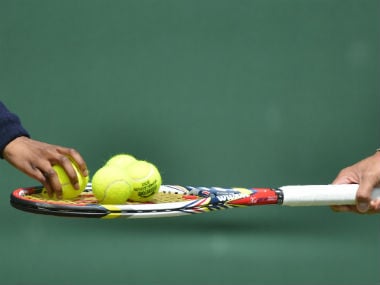Belgian police detain 13 people in tennis match-fixing probe
Brussels: Belgian police on Tuesday held 13 people as part of a major international investigation into match-fixing in tennis, barely a month after a report warned of a "tsunami" of corruption in the lower levels of the sport.
Officers swooped on 21 addresses in Belgium, while simultaneous raids were launched on properties in the US, Germany, France, Bulgaria, Slovakia and the Netherlands.
The raids were part of an international probe into an Armenian-Belgian criminal network suspected of bribing players to throw games.

Representational image. Reuters
Belgian prosecutors said the matches involved were on the low-level Futures and Challenger circuits, away from the gaze of television coverage and where meagre prize money leaves players susceptible to backhanders.
The "investigation showed that an Armenian-Belgian criminal organisation actively would have bribed professional tennis players from 2014 to the present day," the prosecutors said in a statement.
This was done "in order to obtain a pre-arranged match result with the aim of betting on these fixed matches based on insider information, thereby fraudulently boosting winnings," they added.
A judge will decide later on what further action to take against the 13 who have been held.
The suspects mostly fit the same profile, prosecutors said -- no income, no job and facing financial problems. They would be given money to bet on lower-division matches where prize money was around $5,000 to $15,000.
"These tournaments are usually not filmed, which would make the players easier to corrupt and the organisers of fixed matches generate a lot of cash, making themselves guilty of match fixing, corruption, money laundering, participation in the activities of a criminal organisation," the prosecutors said.
Belgian authorities, first alerted to suspicious betting activity in 2015, said the criminal network "would not shrink from violence" and used its contacts to move large sums of money abroad anonymously.
Blight on the game
The latest blow to tennis's reputation comes as the French Open reaches the quarter-final stage, with Novak Djokovic aiming to reach his 32nd Grand Slam semi-final when he faces unseeded Italian Marco Cecchinato at Roland Garros.
Cecchinato was himself embroiled in a match-fixing scandal on the Challenger circuit, earning an 18-month suspension in July 2016 before being cleared of any wrongdoing.
Tuesday's arrests come after the Independent Review of Integrity in Tennis report warned in April that the lower levels of the sport were engulfed in betting-related corruption.
The report said the problems stemmed from too many players in the likes of the Futures and Challenger circuits not earning enough to make a living, coupled with the rise of online betting.
There are around 15,000 professional tennis players but only the top 250 women and the top 350 men even manage to break even before coaching costs, lawyer Adam Lewis, who chaired the review panel, warned in April.
After surveying more than 3,000 players as well as tournament organisers, officials and betting operators, the panel found "evidence of some issues" at Grand Slams and Tour events, but it did not uncover evidence of a widespread problem at those higher levels.
The panel was set up in 2016 following allegations made by the BBC and Buzzfeed that leading players, including Grand Slam winners, were involved in suspected match-fixing and that evidence had been suppressed.
In a further demonstration of the woes blighting the lower rungs of the game, Ukrainian Dmytro Badanov was handed a life ban and fined $100,000 last month for fixing a Futures match in Tunisia in 2015.
Just days before the Badanov ruling, Argentinian player Nicolas Kicker was found guilty of fixing two matches on the second-tier Challenger Tour, and faces a life ban as a result.

No comments:
Post a Comment